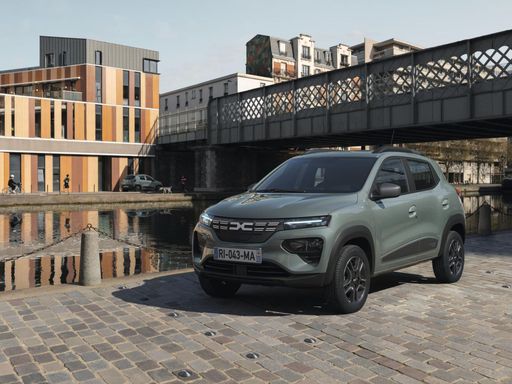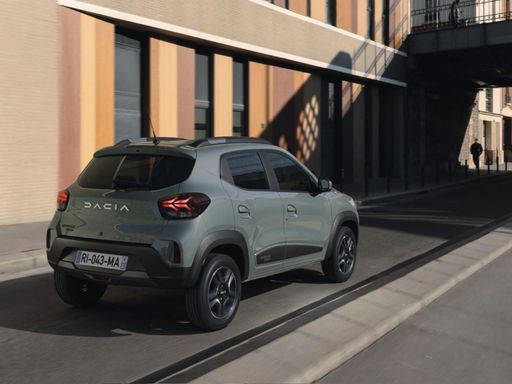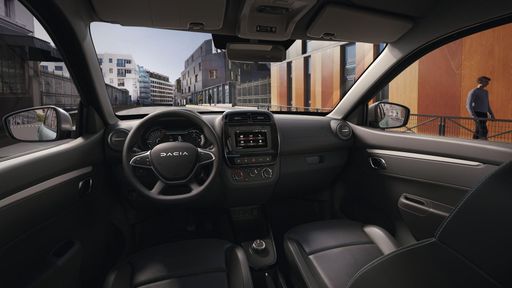Citroen Ami vs Dacia Spring - Differences and prices compared
Compare performance (8 HP vs 100 HP), boot space and price (6800 £ vs 14500 £ ) at a glance. Find out which car is the better choice for you – Citroen Ami or Dacia Spring?
Costs and Efficiency:
Price and efficiency are often the first things buyers look at. Here it becomes clear which model has the long-term edge – whether at the pump, the plug, or in purchase price.
Citroen Ami has a clearly advantage in terms of price – it starts at 6800 £ , while the Dacia Spring costs 14500 £ . That’s a price difference of around 7637 £.
As for electric range, the Dacia Spring performs significantly better – achieving up to 225 km, about 150 km more than the Citroen Ami.
Engine and Performance:
Under the bonnet, it becomes clear which model is tuned for sportiness and which one takes the lead when you hit the accelerator.
When it comes to engine power, the Dacia Spring has a clearly edge – offering 100 HP compared to 8 HP. That’s roughly 92 HP more horsepower.
There’s also a difference in torque: Dacia Spring pulls convincingly stronger with 137 Nm compared to 40 Nm. That’s about 97 Nm difference.
Space and Everyday Use:
Cabin size, boot volume and payload all play a role in everyday practicality. Here, comfort and flexibility make the difference.
Seats: Dacia Spring offers significantly more seating capacity – 4 vs 2.
In curb weight, Citroen Ami is clearly lighter – 470 kg compared to 1070 kg. The difference is around 600 kg.
In terms of boot space, the Dacia Spring offers significantly more room – 308 L compared to 63 L. That’s a difference of about 245 L.
When it comes to payload, Dacia Spring somewhat takes the win – 274 kg compared to 230 kg. That’s a difference of about 44 kg.
Who wins the race in the data check?
The Dacia Spring is clearly superior overall in the objective data comparison.
This result only shows which model scores more points on paper – not which of the two cars feels right for you.
Costs and Consumption
View detailed analysis
Engine and Performance
View detailed analysis
Dimensions and Body
View detailed analysis

Dacia Spring
Citroen Ami
The Citroën Ami is a cheeky, ultra-compact city runabout that turns parking into a non-event and makes traffic feel almost friendly. It won't thrill you with speed or luxury, but as an economical, fuss-free way to nip around town and save on congestion, it's a clever little solution for urban life—with personality to spare.
detailsDacia Spring
The Dacia Spring is an unpretentious city electric that strips EV ownership down to the essentials, offering clean, fuss-free transport for daily urban life. It won't impress luxury-seekers, but its cheerful practicality and rock-bottom running costs make it a clever, no-nonsense choice for anyone who wants electric mobility without the drama.
details


Costs and Consumption |
|
|---|---|
|
Price
6800 - 8200 £
|
Price
14500 - 16900 £
|
|
Consumption L/100km
-
|
Consumption L/100km
-
|
|
Consumption kWh/100km
-
|
Consumption kWh/100km
12.4 - 12.7 kWh
|
|
Electric Range
75 km
|
Electric Range
221 - 225 km
|
|
Battery Capacity
-
|
Battery Capacity
-
|
|
co2
0 g/km
|
co2
0 g/km
|
|
Fuel tank capacity
-
|
Fuel tank capacity
-
|
Dimensions and Body |
|
|---|---|
|
Body Type
Hatchback
|
Body Type
SUV
|
|
Seats
2
|
Seats
4
|
|
Doors
-
|
Doors
-
|
|
Curb weight
470 - 483 kg
|
Curb weight
1070 kg
|
|
Trunk capacity
63 L
|
Trunk capacity
308 L
|
|
Length
-
|
Length
-
|
|
Width
1390 mm
|
Width
1583 mm
|
|
Height
-
|
Height
-
|
|
Max trunk capacity
-
|
Max trunk capacity
-
|
|
Payload
217 - 230 kg
|
Payload
274 kg
|
Engine and Performance |
|
|---|---|
|
Engine Type
Electric
|
Engine Type
Electric
|
|
Transmission
Automatic
|
Transmission
Automatic
|
|
Transmission Detail
Reduction Gearbox
|
Transmission Detail
Reduction Gearbox
|
|
Drive Type
Front-Wheel Drive
|
Drive Type
Front-Wheel Drive
|
|
Power HP
8 HP
|
Power HP
70 - 100 HP
|
|
Acceleration 0-100km/h
-
|
Acceleration 0-100km/h
9.6 - 12.3 s
|
|
Max Speed
-
|
Max Speed
-
|
|
Torque
40 Nm
|
Torque
137 Nm
|
|
Number of Cylinders
-
|
Number of Cylinders
-
|
|
Power kW
6 kW
|
Power kW
52 - 75 kW
|
|
Engine capacity
-
|
Engine capacity
-
|
General |
|
|---|---|
|
Model Year
2025
|
Model Year
2025
|
|
CO2 Efficiency Class
A
|
CO2 Efficiency Class
A
|
|
Brand
Citroen
|
Brand
Dacia
|
What drivetrain options does the Citroen Ami have?
The Citroen Ami is available as Front-Wheel Drive.
